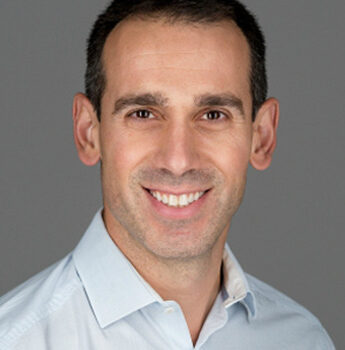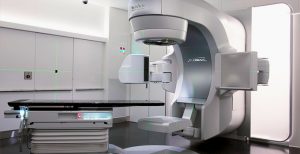
Kathy Willsie
London Health Sciences Centre
Kathy.willsie@lhsc.on.ca
The technology available for treating cancer with radiation is changing rapidly. Over the last 10 years there have been major changes in the way we locate cancer and also in the way we design personalized radiation treatments for patients. These developments have made radiation treatment more accurate, more effective, faster and safer.
Dr. David Palma’s research focuses on new imaging technologies used with radiotherapy to improve tumour targeting and to deliver higher doses of radiotherapy than previously possible, and new imaging methods that can better assess response after treatment. Palma is involved in several cutting-edge clinical trials. He co-led the SABR-COMET randomized trial assessing the role of stereotactic radiotherapy in oligometastatic disease, which demonstrated benefits to ablating metastases with radiation. He also co-led the ORATOR trial, comparing transoral robotic surgery versus precision radiation for cancers of the tonsil and base of tongue, which showed that quality of life with modern radiation techniques was better than with robotic surgery. Palma leads and co-leads the follow-up randomized trials SABR-COMET-10 and ORATOR2. Palma also chairs the Canadian Pulmonary Radiotherapy Investigators Group, which runs radiation-related lung cancer clinical trials and includes central collection of all imaging studies.
Palma also leads the Anatomy and Radiology Contouring Bootcamp for Radiation Oncology Residents an annual course combining anatomic, imaging and contouring instruction that is attended by residents internationally.
Palma’s work also focuses on empowering patients to seek out high-quality cancer care. He is the author of the best-selling book ‘Taking Charge of Cancer: What You Need to Know to Get the Best Treatment’.
- PhD, Department of Radiation Oncology, VU University
- M.Sc., Epidemiology, Harvard School of Public Health
- MD, Western University
- Resident in Radiation Oncology, University of British Columbia
- Clinician Scientist II, OICR
- Radiation Oncologist, London Health Sciences Centre
- Associate Professor, Western University
- Palma DA, Olson RA, Harrow S, …, Senan S. Stereotactic Ablative Radiation Therapy for the Comprehensive Treatment of Oligometastatic Tumors (SABR-COMET): Results of a Randomized Trial. Int J Radiat Oncol Biol Phys. 2018;102(3):S3-S4.
- Palma D. Taking Charge of Cancer. Oakland, CA: New Harbinger Publications, Inc.; 2017.
- Mattonen SA, Palma DA, Johnson C, …, Ward AD. Detection of Local Cancer Recurrence After Stereotactic Ablative Radiation Therapy for Lung Cancer: Physician Performance Versus Radiomic Assessment. Int J Radiat Oncol Biol Phys. 2016;94(5):1121-8.
- Palma DA, Salama S, Lo SS, …, Weichselbaum R. The oligometastatic state – separating truth from wishful thinking. Nat Rev Clin Oncol. 2014;11(9):549-57.
- Palma DA, Senan S, Tsujino K, …, Rodrigues G. Predicting radiation pneumonitis after chemoradiation therapy for lung cancer: An international individual patient data meta-analysis. Int J Radiat Oncol Biol Phys. 2013;85(2):444-50.
- Palma D, Visser O, Lagerwaard F, …, Senan S. The impact of introducing stereotactic lung radiotherapy for elderly patients with Stage I NSCLC: A population-based time-trend analysis. Int J Radiat Oncol Biol Phys. 2010; 28(35):5153-9.
- Palma D, Vollans E, James K, …, Otto K. Volumetric Modulated Arc Therapy (VMAT) for delivery of prostate radiotherapy: comparison with Intensity Modulated Radiotherapy (IMRT) and 3-Dimensional Conformal Radiotherapy (3D-CRT). Int J Radiat Oncol Biol Phys. 2008;72(4):996-1001.
See Dr. Palma’s recent publications on PubMed or on Google Scholar.
Palma has participated and led several pan-Canadian and international initiatives, including clinical trials and meta-analyses. His research team and collaborators in London can offer several types of support, including clinical trial design, data collection and analysis and imaging analysis.
Visit OICR’s Collaborative Research Resources directory for more opportunities to collaborate with OICR researchers.


